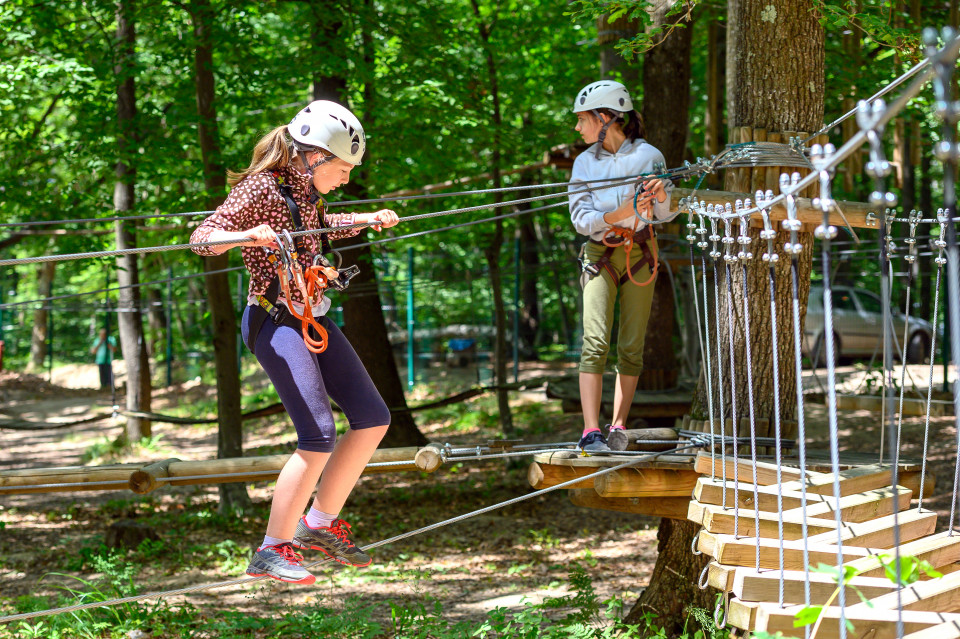This Incredible Camp Experience on the Main Line Is Literally Life-Changing

Photo Credit: Getty Images
Summer camp memories can last a lifetime. Whether meeting a best friend or finally making it to the top of the rock climbing wall, those childhood experiences, for better or worse, end up playing a critical role in who children grow up to become.
In an era when so much research and science on what makes a positive environment for children’s growth is out there, what if there was a better way to do summer camp? Instead of leaving those transformative experiences to young counselors who, let’s face it, might not be totally invested in their summer jobs, what if you had learning experts guiding kids through some of the most cherished moments of their childhood?
Woodlynde School Summer Camp in Strafford, Pa. is doing just that. The associated Woodlynde School specializes in a pedagogical approach that prioritizes social-emotional learning and individualized instruction in classes led by highly trained, certified experts—a unique approach to what’s known as “differentiated instruction” that Woodlynde has honed through a half century of working with talented students who learn differently. The method makes each learning moment as effective as possible for each student.
Woodlynde’s summer camp seeks to extend that innovative, optimized approach beyond the classroom to create a smarter camp experience. Instead of more typical counselors, their teachers lead traditional summertime activities (like arts and crafts, swimming and group sports) and integrate their evidence-based methods throughout. Think of it as a kind of summer camp 2.0.

Academic Mornings
The camp approaches the relationship between camp leaders and the kids, as well as the way each day’s activities fit into the camp’s larger goals (inspiring curiosity, maximizing growth and building confidence) from that grounding in pedagogical science. And they do it without sacrificing fun.
In the morning, kids dive into multi-sensory explorations of subjects like math, reading comprehension and writing in groups no larger than seven that are personally overseen by a Woodlynde teacher. All teachers are trained and certified in the Wilson Reading System®, a research-based, multi-sensory structured literacy program designed to turn out independent, confident readers and writers.
Each teacher sticks with their students throughout the course of the camp, carefully learning their strengths and areas of improvement so they can craft learning tasks that are appropriately challenging and tied to students’ interests. It’s part of Woodlynde’s commitment to an approach called Responsive Classroom. All K-8 teachers at Woodlynde are trained in the Responsive Classroom approach to teaching that centers students and their social-emotional wellbeing so they feel safe, engaged and included.
“We think about summer camp mornings in the same way we think about our school year. The groups for math and reading are kept intentionally small, five to seven students in each one, which is the same way our program runs through the year,” Elizabeth Maglio, Assistant Head of School for Lower and Middle School, says. The small class sizes allow teachers to effectively manage that positive social-emotional environment that’s crucial to student success.
“Responsive Classroom is all about meeting students where they are,” Christopher Kramaric, Director of External Affairs, says. This is an important element in making the academic part of Woodlynde’s Summer Camp function at its best: strong relationships can actually boost retention and fend off the so-called “summer slide” that teachers fear, where students forget much of the information they learned over the previous school year.
To further strengthen those relationships, each day of camp kicks off with what Woodlynde calls Morning Meeting, a block of time set aside every day for greeting, sharing and group activity. Teachers lead discussions, giving them an opportunity to learn more about students, as well as for the students to build trust in the teachers. They also pose questions that can grow into substantial discussions of the work they’ll do that day or reflections on the previous day’s activities. Since anyone can join the Woodlynde Summer Camp, not just current students, this daily practice becomes a bonding exercise at the heart of forming community.
“We want to make sure that everyone who walks through the door feels a sense of belonging, even if they’re just here for the summer,” Maglio says.
Adventurous Afternoons
Students can choose whether or not to take part in Woodlynde’s afternoon program after their productive morning, but the two experiences function as integrated parts of a whole. Teachers will often also lead groups through traditional summer camp activities in the afternoons, which gives them a further opportunity to shape their students’ experiences in a positive way.
“They’re typically all trained Woodlynde teachers. They get to know the students really well, their strengths, their interests. They get to know their areas of need. They make sure it’s fun and engaging and high interest level,” Maglio says.
Activities are designed to create a sense of adventure. They include swimming, rock climbing, canoeing and hiking. In this way, the academic mornings are translated into fun with a purpose—growth—in the afternoons.
“It’s driven by the fundamentals of experiential learning. You set up or brief the experience, you have the experience, then you debrief from that experience. We do a lot of reflection on our learning at Woodlynde,” Maglio says.
Crafts and special activities are often based on something learned in the morning. Conversely, in the next day’s Morning Meeting, teachers will often ask children to reflect on what they learned during activities the previous day.
“We talk to students about ’Following the PATH’, which stands for perseverance, accountability, trust and humility. Those traits are tangible outcomes we’ve seen in students after they’ve gone through the summer camp,” Kramaric says. “The arts and physical activities are just one more opportunity to teach those values in terms of success and challenge.” With a Woodlynde teacher, a missed soccer goal becomes a moment to grow from a setback.
This comes full circle. Through those reflections, teachers and students alike identify passions and pitfalls, both of which inform the academic and extracurricular program that’s put together for the student each subsequent day. Importantly, older students are allowed to choose their afternoon adventures: Those in grades 6-10 can pursue subjects like studio art, music production, cinematography, robotics or coding.
Learning How to Learn
That autonomy is one of the most critical aspects of the Woodlynde School Summer Camp experience. The tools that Woodlynde provides to their kids are designed to stick around for the long term and turn them into their own best advocates.
Metacognition (thinking about how you think) in particular is a focus. Each student has their own way of tackling a challenging passage in a book or a word problem, but Woodlynde gives every student the ability to reflect on their own thinking and decide how to best approach a problem the next time they encounter it.
“We’re teaching them how they learn, whether they’re Woodlynde students or just with us for the summer, and that’s something that sticks with a kid for life,” Maglio says.
This is supported concretely with a report at the end of the camp, which offers recommendations for what students can do to become more successful in subjects where they showed strength or faced challenges. Altogether, the structure of the day gives kids the freedom to pursue what they are passionate about while ensuring that the experience makes a lifelong impact. Maglio points out that the summer surprises both parents and children by how transformative it is, so much so that many campers who aren’t Woodlynde students end up enrolling come fall.
“They’ll say, ‘Finally someone understands me, finally someone gets the way I learn. Now, I really love learning.’”
This is a paid partnership between Woodlynde School and Philadelphia Magazine

